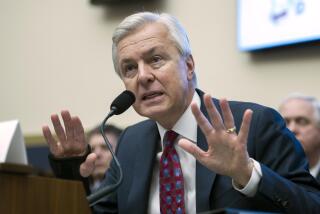House Panel Releases Hutton Papers : Ex-President Told of Overdrafts in ‘80, Documents Show
- Share via
WASHINGTON — Former E. F. Hutton President George L. Ball received glowing reports of profits from the firm’s deliberate overdrafting of bank accounts in mid-1980 even as banks around the country complained that the scheme was bilking them, according to documents released Thursday by a House Judiciary subcommittee.
In testimony to the Judiciary subcommittee on crime, five Hutton employees--all participants in overdrafting--denied that they knew the practice robbed banks of millions in investment income and frequently suggested that higher-ups knew more than the committee witnesses did about the check-kiting scheme.
The panel’s chairman, Rep. Bill Hughes (D-N.J.), frequently called the testimony “incredible.” Despite the denials, Rep. Romano L. Mazzoli (D-Ky.) said, the documents and testimony implied that “the genesis of this thing was in the board room in New York City.”
New York-based Hutton pleaded guilty in May to running a huge check-kiting scheme in the early 1980s that netted it millions in interest income on money overdrawn from hundreds of banks. Although the firm paid a $2-million fine, the Justice Department and top Hutton officials have denied that any top executives knew of the crimes, and no one has been personally charged.
Knew Outlines of Scheme
A cascade of internal Hutton documents released Thursday indicated that several Hutton executives and Ball knew the outlines of the overdrafting practice long before it was halted in 1982 and long after major banks had demanded that it cease.
Ball, now president of Prudential-Bache Securities, has denied any illegalities at Hutton.
An April, 1980, memo from a Hutton vice president to Ball noted that the firm’s branches in Washington and Casper, Wyo., earned huge amounts in interest income and added: “Both offices have one thing in common; they overdraft substantially through Bill Sullivan in New York. . . . It is a very profitable product for the branches.”
Sullivan, Hutton’s cash-management officer until 1980, told the subcommittee that he designed the overdrafting strategy to move funds quickly to the company’s central bank accounts. Only later did someone reverse the scheme by running overdraft checks through “chains” of banks, delaying their arrival in New York instead of hastening it, he said.
Other Hutton documents, however, indicated that banks in Chicago, New York and Kansas City were complaining as early as 1978 that Hutton’s massive overdrafting was costing them hundreds of thousands of dollars in lost income. And a June, 1980, memo to Hutton Vice President Tom Morley, who succeeded Sullivan that month, documented the moving of Hutton checks through a long chain of Southern banks before being shifted to New York.
More to Read
Get the L.A. Times Politics newsletter
Deeply reported insights into legislation, politics and policy from Sacramento, Washington and beyond. In your inbox twice per week.
You may occasionally receive promotional content from the Los Angeles Times.








